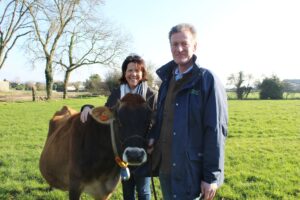
By Jess McGovern, Head of Education and of the Cultivate programme of the Royal Jersey Agriculture & Horticulture Society
Over the centuries, the Island’s corn growers, tomato growers, cider makers, dairy farmers, potato farmers, horticulturalists… and all other stewards of the land who spent their working lives in creating profitable rural enterprises, would most likely be confused that an article titled ‘Rural Matters’ might ever be necessary. Surely, they would have thought, it would be self-evident that ‘Rural Matters?’
The confusion would be because of the importance of Jersey’s agriculture and agricultural history, which date back to Neolithic times, such as its advantageous climatic position, the ambitious and passionate bloodlines of farmers and horticultural growers past and present, a population well over 100,000 people, an Island where food security has been threatened on numerous occasions by natural and human events in the last few years alone, not to mention the Island’s distinctive gardens and unique plant collections. So, why should it be at all necessary to stress that ’Rural Matters’?
Perhaps ‘Rural Matters’ could be best interpreted as matters that relate to pioneering skills development, aimed at encouraging new entrants into the rural industries and building on the critical agricultural and horticultural knowledge base that exists in the Island. I am afraid to say, however, that this is not the case…. but I am very hopeful and excited to say: with vision, priority and investment, it could be.
As an Island, we have all the essential ingredients to rise to the challenge in developing pioneering initiatives aimed at future-proofing the Island, by providing curious citizens of all ages and the next generation with opportunities to learn about food provenance, horticulture, soil health and environmental stewardship.
In addition to global challenges, the newest challenge is one that rural industries have traditionally not had to face: that of a growing skills gap within these industries. Despite the highly significant contribution to the local economy, local culture and to a sense of place among Islanders and tourists, the agricultural and horticultural industries are both facing a critical watershed moment in their workforce succession planning, skills needs and related growth opportunities. This needs a response – and quickly.
Skills development has been recognised as a key factor to bridge the gap and address the lack of uptake in the rural sector. There is a notable gap in the age group of current agriculturalists and horticulturalists, with the average age of those in the industry at 55. This is not to say there is a lack of interest amongst the younger generation to enter the industry: the blockages historically have been the absence of educational courses in the Island that would have encouraged those wanting to enter or continue to work in the industry. As an Island community, we need to encourage entrants into the rural sector. Currently, there are limited pathways available but, as stated above – there could be.
It may be helpful to share with RURAL readers what discussions with the agricultural and horticultural industries during 2019-2022, have indicated:
- Skills and labour issues are of key concern for the entire sector in the current, near and medium term
- There is a relatively high proportion of vacancies in skilled trades, professional and technical occupations and supervisory positions including a low number of apprentices in the sector
- The number of jobs in skilled trades and supervisory staff are predicted to rise
- With regards to horticulture, the impact from the closure of the Philip Mourant Training Centre is a reduction in locally trained horticulturalists. This has resulted in an ageing, full-time, part-time and trainee workforce within the horticulture sector
- The low number of apprentices in the sector combined with evidence of more than 100 application responses to the Trinity Manor Apprenticeship (advertised in October 2020) indicate that there is a demand among 18–25-year-olds and also, that talent inflow paths into the sector need to be improved.
The picture shows the Trinity Manor Gardening Apprentice, Wills Baker, leading a group of future gardening apprentices with their employers around Trinity Manor in July 2022. There are currently now five gardening apprentices enrolled with the RHS, employed by four different employers. This is extremely encouraging. The priority is now to enhance their apprenticeships through collaborating to offer valuable, effective and inspiring horticultural training experiences.
A vision for skills development in the land-based sector is critical in order to encourage new entrants into the industry, thereby building on the Island’s knowledge base. ‘Cultivate’ – the educational and training initiative of the RJA&HS – proposes that the Government of Jersey co-ordinates with the sectors to part-fund and develop a stimulating and dynamic land-based apprenticeship programme, in order to improve more local access to relevant training along with a sustainable talent pipeline.
However, I understand that this proposal needs to be presented in an evidence-based manner. So, I have set out to achieve this through creating an evidence-based report, called RURAL MATTERS. The agricultural and horticultural industries are aligned in many ways but also differ considerably in their profile and training needs. Therefore, Rural Matters, first of all, will be focusing upon the horticulture amenity sector. The agricultural sector will be surveyed following the conclusion of the ‘Rural Matters: Cultivate Horticulture’ report.
According to the RHS: ‘a seismic shift in attitudes is occurring as ever more evidence shows how important gardens and plants are for our physical, mental, and social wellbeing.’ A paper titled ‘Botanical education extinction and the fall of plant awareness’ (2022) from the University of Leeds, includes a warning from a group of research scientists, who state that people are becoming ‘disconnected from the botanical world’ at a time when plants could ‘help solve global environmental problems’. The study concludes with a sobering thought: ‘we ignore the opportunities presented to us by the botanical world at our own peril.’
By engaging and listening to those in the industry, in education, and in government, the Rural Matters: Cultivate Horticulture report will aim to explore locally the skills in the horticultural and agricultural industries, e.g the numbers employed, staff shortages, skills gaps and recruitment success. The report hopes to present clearly the specific pathway opportunities that require investment by the industry and Government partners and other interested funding sponsors. The overall aim of the report hopes firstly to inform, and then subsequently to provide the basis for stakeholder and political targeted action. I look forward to sharing this report in due course.
Globally, we are facing a collective challenge: climate change and war, causing rising energy, food and fuel costs. Locally, we have the opportunity to engage people who want to be part of an industry which is at the forefront in making positive change to the land, the environment and to food security.
I hope the tone of this article will be galvanising, as immediate action is required. ‘Time is of the essence’, a member of the rural community said to me recently, and I agree. I also hope that this article is read with a measure of optimism, hope and excitement.
Much like our ancestors to whom I referred at the beginning of this article, Jersey needs to respond to challenges once again in a pioneering way by capitalising on our rural heritage. Jersey has the opportunity to be a world-leading centre of land-based innovation and excellence and to be a protector of the planet.
Jersey – the small island in the Channel with big ideas. It is a legacy of which our forebears would be proud for us to take onwards for the benefit both of the current generation and for those of the future.




